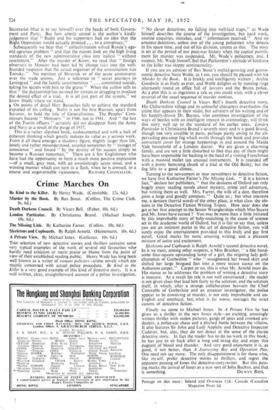Crime Marches On
Be Kind to the Killer. By Henry Wade. (Constable. 12s. 6d.) Murder by the Book. By Rex Stout. (Collins, The Crime Club.
• 9s. 6d.) Death Darkens Council. By Vicars Bell. (Faber. 10s. 6d.)
THLS selection of new detective stories and thrillers contains some very typical examples of the work of several old favourites who hardly need criticism or merit praise or blame from the point of view of their established reading public. Henry Wade has long been well known as a writer of romans policiers—crime novels which are mainly concerned with actual police procedure. Be Kind to the Killer is a very good example of this kind of detective story. It is a well written, clear, straightforward account of a police investigation.
" No clever detectives, no falling into well-laid traps," as Wade himself describes the course of the investigation, but hard work, routine enquiries, mistakes, and " information received." And no amateur detectives, .unless one of the young policemen who detects in his spare time, and out of his division, counts as this. The story is set at the period of our post-war history when the capital punish- ment for murder was suspended. Mr. Wade's policemen, and, I suspect, Mr. Wade himself, Teel that Parliament's attitude of kindness to the killer was sloppy sentimentality.
If you are an admirer of Rex Stout's orchid-growing and gastro- nomic detective Nero Wolfe, as I am, you should be pleased with his Murder by the Book. It is briskly and intelligently written ; Archie Goodwin is as lively as ever, and Wolfe delights us by running rings alternately round an office full of lawyers and the Bronx police. As a plot this is as ingenious a tale- as you could wish, with a clever reversal of the usual sequence of murder motives.
Death Darkens Council is Vicars Bell's fourth detective story. His Chilternshire village and its colourful characters overshadow the crime that appears in their midst, but admirers of his writing and of his happily-drawn Dr. Baynes, who combines investigation of the ways of beetles with an intelligent interest in criminology, will think this story well up to the standard of his earlier ones. London Particular is Christianna Brand's seventh story and is a good Brand, though net very credible in parts, perhaps partly owing to the all- pervading pea-soup fog which swirls through the book- and provides convenient cover for strange happenings in and around the Maida Vale household of a London doctor. We are given a charming family, and are not a little disturbed to find that any of them might have been responsible for bashing in the head of a visiting Frenchman with a mastoid mallet (an unusual instrument). It is rounded off with a pretty bemusing chunk of a trial at the Old Bailey, but the fog lifts to a good climax.
Turning to the newcomers or near newcdThers to detective fiction, we have first Katharine Farrer's The Missing Link. " It is a known fact," declare her publishers, " that the denizens of Oxford not only hugely enjoy reading novels about mystery, crime and adventure, but writing them as well. Mrs. Farrer, the wife of a don, therefore joins a large and goodly company." Quite so ; but what interests me, a denizen (horrid word) of the other place, is what class she ob- tains in the Detective Fiction Writing Tripos. How near does she get at her first attempt to the Senior Wranglerships which Miss Sayers and Mr. Innes have earned ? You may be more than a little irritated by this improbable story of baby-snatching in the cause of science set in the academic world of Oxford, but it is fair to say that, unless you are an insistent purist in the art of detective fiction, you will surely enjoy the entertainment provided in this lively and gay first novel. Good marks for some amusing writing, and a pleasant mixture of satire and excitement.
Skeletons and Cupboards is Ralph Arnold's second detective novel. In it we meet, among other suspects, a Miss Brunker, " a fine hand- some four-square upstanding lump of a girl, the reigning lady golf- champion of Grebeshire " who " straightened her tweed skirt and shifted her large brogued feet into a more secure stance on the Aubusson carpet." Carpet or no, this is what Mr. Arnold must do. His stance as he addresses the problem of writing a detective story is insecure. As a result his tale is not well constructed ; the reader is not given clues that lead him fairly to the solution, and the solution itself, in which, after a strange collaboration between the Chief Constable of Grebeshire and an amateur investigator, the police appear to be conniving at murder, is not only improbable and un- English and unethical, but, what is far worse, outrages the strict canons of detective fiction.
Finally we come to -Michael lnnes. In A Private View he has given us a thriller in the new Innes style—an exciting, amusingly written thriller with stolen pictures, gangs of spies and crooked art- dealers, a police-car chase and a pitched battle between the villains. It also features Sir John and Lady Appleby and Detective Inspector Cadover, but, alas, they do not detect in the sense of the classic detective story. In fact the reader has to do no work in this book; he has just to sit back after a long and tiring day and enjoy this pageant of blood and thunder. And very good enjoyment it is, as good, if not better, than A Journeying Boy and Operation Pax. One need not say more. The only disappointment is for those who, like myself, prefer detective stories to thrillers, and regret the apparent passing of Innes the detective-story-writer. But this pass- ing marks the arrival of limes as a new sort of John Buchan, and that










































 Previous page
Previous page